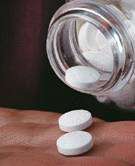(HealthDay)—Prescribing aspirin for primary cardiovascular disease (CVD) prevention should be judged on an individual basis by health care providers, according to an article published online Sept. 1 in Trends in Cardiovascular Medicine.
Charles H. Hennekens, M.D., Dr.P.H., from Florida Atlantic University in Boca Raton, and James E. Dalen, M.D., M.P.H., from the University of Arizona in Tucson, reviewed the literature relating to aspirin use for primary and secondary prevention of CVD events.
The authors noted that for secondary prevention patients, the benefits of aspirin seem to clearly outweigh the risks of a serious vascular event. The benefit-to-risk ratio for aspirin is less clear in primary prevention, with results of ongoing trials not yet available. Until such results are available, health care providers should make judgments relating to aspirin for primary prevention of a first CVD event on an individual basis. Advocating the routine use of aspirin for apparently healthy individuals seems premature, the authors write. The increasing global burden of CVD in developed and developing countries highlights the need for more widespread drugs of proven net benefit.
"At present, therefore, the biggest current research challenge in aspirin in primary prevention of CVD has been to identify apparently healthy subjects with the potential to derive net benefits," the authors write.
One author disclosed financial ties to the pharmaceutical and medical technology industries.
More information:
Abstract
Full Text (subscription or payment may be required)
Copyright © 2014 HealthDay. All rights reserved.





















